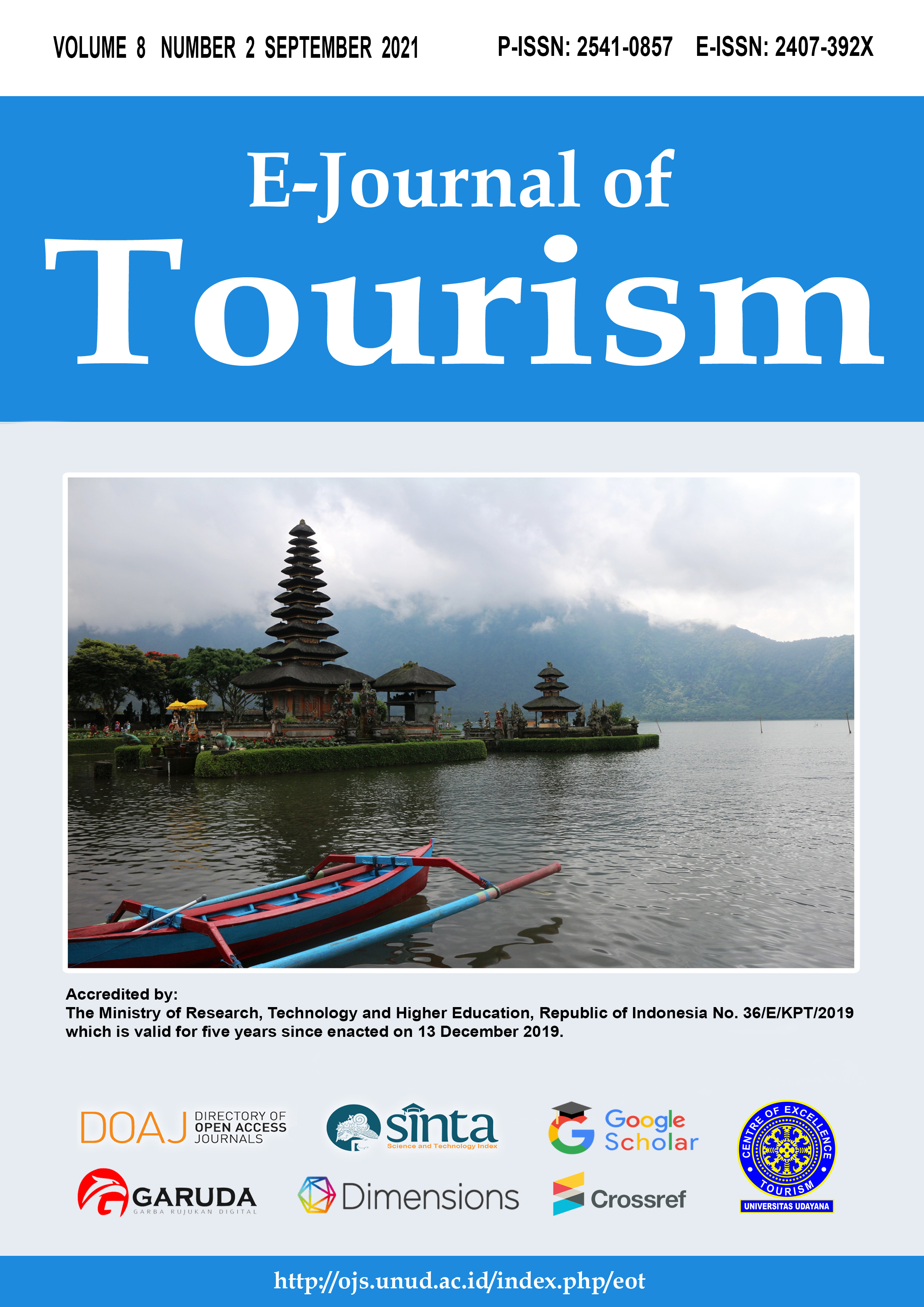Green Hotel Concept and Practices in Indonesia
Abstract
The term of green hotel is still less popular in the community, tourists and even tourism practitioners, as well as many people who do not understand the definition and practice. In Indonesia, green hotels remain an important concern for the government and the private sector regarding the contribution to environmental preservation and reducing the impact of global warming. The application of the green hotel concept still raises pros and cons due to a number of burdensome requirements for business actors. They mostly assume green hotel is a burden and will reduce the comfort of hotel guests. Eventhough in terms of tourists side many of them need green hotel, but in fact not all travelers understand about the green hotel, especially in Indonesia. This paper examines a number of green hotel empirical concepts and facts that have been conducted in various countries and then compares with Indonesia. The case in Yogyakarta is an example on how tourists have not fully understood the concept of green hotels
Downloads
References
Akehurst, G., Afonso, C., & Goncalves, H. M. (2012). Re-examining Green Purchase Behaviour and The Green Consumer Profile: New Evidences Management Decision, 50(5), 972-988. doi:https://www.doi.org/10.1108/00251741211227726
Association, G. H. (2018). Why Should Be Green ? Retrieved from http://www.greenhotels.com/
Auliandri, T. A., & Angraeny, R. (2017). The Implementation of Green Hotel Management Standard in Majapahit Hotel Indonesia. International Journal of Organizational Innovation, 9(3), 45-62.
Baker, M. A., Davis, E. A., & Weaver, P. A. (2014). Eco-friendly Attitudes, Barriers to Participation, and Differences in Behavior at Green Hotels. Sustainability and Marketing Cornell Hospitality Quarterely, 55(1), 89-99. doi:https://www.doi.org/10.1177/1938965513504483
Chan, X., & Chan, K. (2013). Perception of Green Hotels Among Tourist in Hong Kong : An Exploratory Research,. Service Marketing Quarterly, 34(1), 339-352. doi:https://www.doi.org/10.1080/15332969.2013.827069
Graci, S., & Dodds, R. (2008). Why Go Green ? The Business Case For Environemtal Commitmen in The Canadian Hotel Industry Anatolia : An International Journal of Tourism and Hospitality Research, 19(2 ), 251 - 270. doi:https://doi.org/10.1080/13032917.2008.9687072
Gunn, C. A. (2002). Tourism Planning : Basic, Concept, Cases (4th ed.). Routledge: Psychology Press
http://selectusa.commerce.gov. (2018). Retrieved from http://selectusa.commerce.gov
Jaiswal, D., & Kant, R. (2017). Green purchasing behaviour: A conceptual framework and empirical investigation of Indian consumers. Journal of Retailing and Consumer Services, 41, 60–69. doi:https://doi.org/10.1016/j.jretconser.2017.11.008
Johri, L. M., & Sahasakmontri, K. (2016). Green marketing of cosmetics and toiletries in Thailand. Journal of Consumer Marketing, 15(3), 265-281. doi:http://dx.doi.org/10.1108/07363769810219134
Kemenpar. (2013). Green Hotel Award Menjadi Nilai Tambah Standar Pelayanan Hotel [Press release]. Retrieved from http://kemenpar.go.id/asp/detil.asp?c=16&id=650
Kemenpar. (2016). Panduan dan Pedoman Pelaksanaan Green Hotel di Indonesia
Manaktola, K., & Jauhari, V. (2007). Exploring cosumer attitude, and behaviour towards green practices in the lodging industry in India. Journal of Contemporary Hospitality Management, 15(5). doi:https://www.doi.org/10.1108/09596110710757534
Mensah, I. (2014). Different Shades of Green : Environmental Management in Hotels in Accra. International Journal of Tourism Research, 16, 450-461. doi:https://www.doi.org/10.1002/jtr.1939
Nadia Tszentke, David Kirn, & Lynch, P. A. (2014). Reason Going Green in Service Accomodation Establishment International Journal of Contemporary Hospitality Management, 1(16), 2. doi:http://www.doi.org/10.1108/09596110410520007
Nor Azila Mohd Noor, Haniza Shaari, & Kumar, D. (2014). Exploring Tourists Intention to Stay At Green Hotel : The Influence of Environmental Attituded and Hotel Attributes. A Multidisciplinary Journal of Global Macro Trends, 3(7).
NTOs, A. (2012). ASEAN Green Hotel Standard.
Penny, W. Y. K. (2007). The use of environmental management as a facilities management tool in the Macao hotel sector. Facilities, 25(7/8), 286-295. doi: https://doi.org/10.1108/02632770710753325
Perera, H. L. N., & Pushpanathan, A. (2015). Green Marketing Practices and Customer Satisfaction: A Study of Hotels Industry in Wennappuwa Divisional Secretariat Paper presented at the The 7th Tourism Outlook Conference/Tropical Tourism Outlook Conference, 8-10 August 2014, Dambulla - Kandalama, Sri Lanka http://geog.nau.edu/igust/srilanka2014/ (Copyright: CC-BY-NC-ND) Srin Lanka.
Rahman, M. (2017). The Influencing Factors of Eco-Friendly Products towards Customer Satisfaction: A Study in Bangladesh The SIJ Transaction on Industrial, Financial & Business Management (IFBM), 5(4).
Robinot, E., & Giannelloni, J. L. (2015). Do hotels’ “green” attributes contribute to customer satisfaction? Journal of Services Marketing, 24(2), 157-169. doi:http://dx.doi.org/10.1108/08876041011031127
Sharma, R. S. a. S. (2011). Hotel Industry Embrace Green Revolution Accross The Globe. International Transactuon in Applied Sciences, Vol 3 (No 3 ), 363-380.
Sinangjoyo, N. J. (2013). Green Hotel Sebagai Daya Saing Suatu Destinasi (Studi Kasus Pada Industri Hotel Berbintang di Wilayah Yogyakarta). Jurnal Nasional Pariwisata, 5(No 2), 83 - 95.
Sofia Batista Ferraz, Cláudia Buhamra, Michel Laroche, & Veloso, A. R. (2017). Green Products : A Cross-Cultural Study of Attitude, Intention and Purchase Behavior. RAM (Mackenzie Management Review) Sao Paulo, 18(5), 12-38 doi:https://www.doi.org/10.1590/1678-6971201
Sonya Graci, & Kuehnel, J. (2011). How to Increase Your Bottom Line by Going Green Retrieved from Canada: http://green.hotelscombined.com/Pages/MainGreen/Downloads/responsible-traveler-guide.pdf
Wolok, T. (2019). Analysis of The Effect of Green Marketing on Consumer Purchasing Decisions on The Body Shop Gorontalo Product. International Journal of Applied Business and International Management, 4(2). doi:ttps://doi.org/10.32535/ijabim.v4i2.569
www.ecotourism.org. (2012). International Ecolodge Guideline yang diterbitkan oleh The Internasoinal Ecotourism Society (TIES) Retrieved from https://www.ecotourism.org/ecolodges
Yang, Y. C. (2017). Consumer Behaviour Towards Green Products. Journal of Economics, Business and Management, 5 (4 ). doi:https://www.doi.org./10.18178/joebm.2017.5.4.505

This work is licensed under a Creative Commons Attribution 4.0 International License.
The copyright of the received article shall be assigned to the journal as the publisher of the journal. The intended copyright includes the right to publish the article in various forms (including reprints). The journal maintains the publishing rights to the published articles.




















